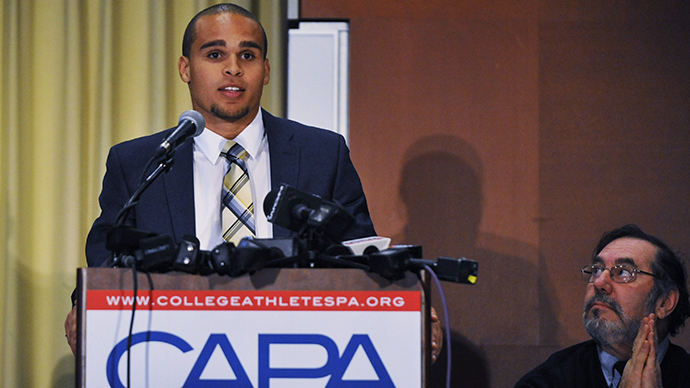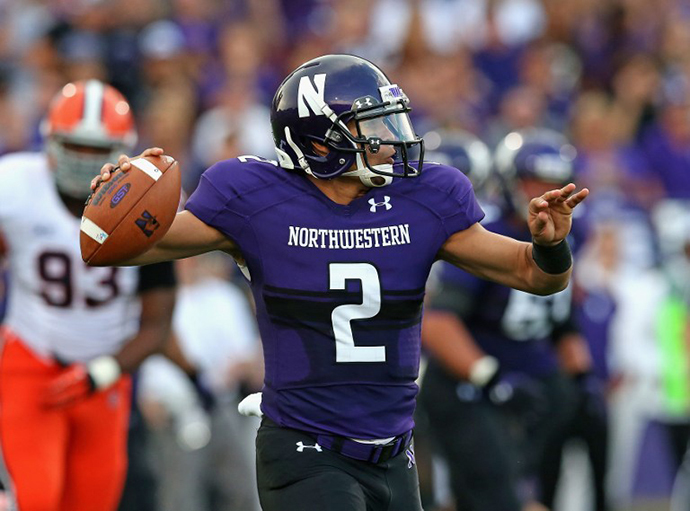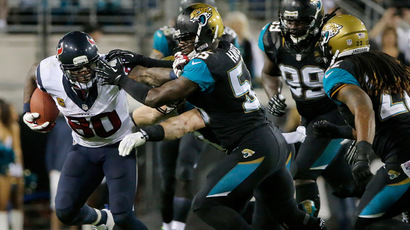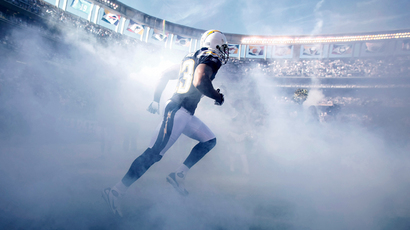College athletes file petition to create labor union

Division I college football players took the initial step Tuesday in forming the first-ever labor union for college athletes seeking, for example, safety protections and full compensation for education and medical expenses that result from competition.
A petition for recognition was filed at a regional National Labor Relations Board office in Chicago by Ramogi Huma, president of the National College Players Association, on behalf of football players at Northwestern University. Huma also filed union cards signed by several Northwestern players with the Board, ESPN’s "Outside The Lines" reported.
Northwestern Quarterback Kain Colter represented the players at a news conference in Chicago. Backed by the United Steelworkers union, which has agreed to pay legal bills in the players’ effort, Colter said it was time for athletes to have a say in decisions currently dictated by the National Collegiate Athletic Association (NCAA).
"The action we're taking isn't because of any mistreatment by Northwestern," Colter said, ESPN reported.
"We love Northwestern. The school is just playing by the rules of their governing body, the NCAA. We're interested in trying to help all players -- at USC, Stanford, Oklahoma State, everywhere. It's about protecting them and future generations to come.
"Right now the NCAA is like a dictatorship. No one represents us in negotiations. The only way things are going to change is if players have a union."
He added that, currently, players have next to no say about safety decisions or financial compensation questions. The NCAA’s hundreds of millions of dollars in revenue from college sports bolsters their argument, he said.
"How can they call this amateur athletics when our jerseys are sold in stores and the money we generate turns coaches and commissioners into multimillionaires?" Colter asked at the news conference.
The NCAA and the Big Ten Conference, which Northwestern is part of, criticized the move, saying “student-athletes” cannot be considered employees.
“This union-backed attempt to turn student-athletes into employees undermines the purpose of college: an education,” the NCAA said in a statement. “Student-athletes are not employees, and their participation in college sports is voluntary. We stand for all student-athletes, not just those the unions want to professionalize.”
Huma said the effort to unionize began last spring when Colter approached him for assistance in giving representation to tens of thousands athletes at hundreds of NCAA-member schools.
"This is about finally giving college athletes a seat at the table," said Huma, a former football player at UCLA who created the NCPA in 2001. "Athletes deserve an equal voice when it comes to their physical, academic and financial protections."
Huma said a union would aid in maintaining scholarships, cover living expenses including tuition and possibly help push for medical coverage that may linger beyond college. He added that, currently, scholarship athletes are left without money to cover basic expenses.
In 2009, a study by Huma’s NCPA found that “full scholarship” athletes routinely incur added expenses to cover the actual cost of a Division I university.
The effort to unionize does not have much in the way of precedence. Somewhat related, in December over 600 graduate teaching students and research assistants at New York University formed a union, affiliated with the United Auto Workers, the first such union in the US to win recognition by a private university.
The push for unionization will first focus on private universities like Northwestern, with public universities to follow, Huma said. "This will be the first domino,” he added.

Former National Labor Relations Board chairman William B. Gould IV told the AP he believes the Board will rule for the players.
"The major obstacle is the Brown University decision of a decade ago," he said, referring to the Board’s 2004 decision to end the right of graduate students at private schools to unionize.
The NCAA has fallen under intense scrutiny for current amateurism rules of college sports despite the billions of dollars earned from many outlets, from television contracts to memorabilia sales. It is currently fighting a class-action federal lawsuit filed by former players seeking a share of such revenue.
In addition, multiple lawsuits have been filed by former college football players who claim the NCAA did not adequately protect them from severe head injuries.
NCAA athletes receive a stipend to cover living costs. NCAA President Mark Emmert and others have proposed a $2,000-per-player stipend, as well, yet critics have called it woefully low and insulting to players as the NCAA and its schools rake in millions.
The National Labor Relations Board’s Gregory King confirmed the players’ petition, saying the board would like conduct a hearing in the next 10 days.
United Steelworkers official Tim Waters told AP the key issue is whether football players can be called employees as defined by federal law. If so, they have legal rights to organize.
"It's crystal clear that college football players are employees," he said, adding that most put in around 40 hours of work on their sport and generate revenue for their schools, conferences and the NCAA.
Colter and other players on seven other teams around the nation wore wristbands and other apparel during games this past football season featuring the hashtag “#APU” - All Players United - that amounted to a quiet protest.
Huma said an “overwhelming majority” of Northwestern players signed union cards. For the National Labor Relations Board to consider a petition for unionization, at least 30 percent of the members in the group serving an employer must sign union cards.
For its part, Northwestern University did not support the move, yet said it does believe the athletes bring up valid points about health issues, for instance.
"Northwestern believes that our student-athletes are not employees and collective bargaining is therefore not the appropriate method to address these concerns," said Jim Phillips, Northwestern vice president of athletics and recreation. "However, we agree that the health and academic issues being raised by our student-athletes and others are important ones that deserve further consideration."
One self-identified Northwestern player took to Reddit to describe his view, which, he underscored, is not only about getting a share of the high revenue amounts the NCAA incurs.
"This isn't about getting paid. What it is about is protection. Many of us will have numerous injuries throughout our playing careers. A group of those players will continue to feel the effects of those injuries long after their playing days are over. The goal is to have some sort of medical protection if we need surgeries stemming from injuries sustained while playing for our university,” said goB1Gcats on subreddit r/CFB.
“It isn't about getting an extra $200 a month for spending. We have our stipend, and if we budget correctly we are able to make it stretch for the month. Would it be nice to have some part of jersey sales or memorabilia sales? Absolutely. But that is not the goal as of right now.”














